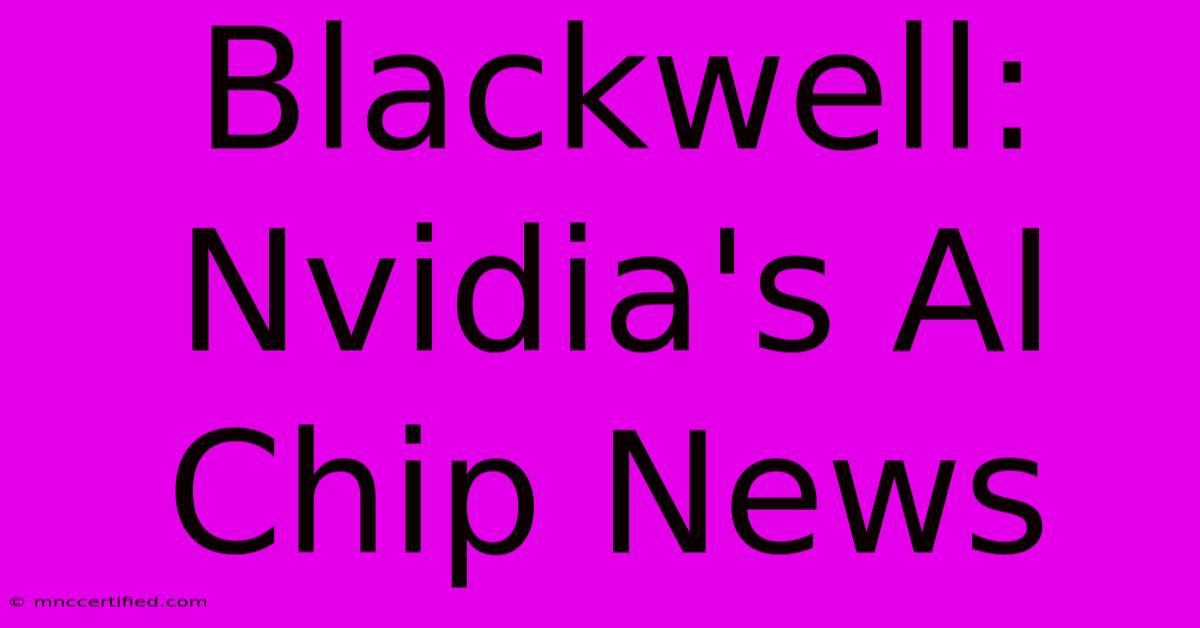Blackwell: Nvidia's AI Chip News

Table of Contents
Blackwell: Nvidia's Next-Gen AI Chip – A Deep Dive
Nvidia's dominance in the AI chip market is undeniable, and their latest advancements continue to push the boundaries of what's possible. Whispers about "Blackwell," Nvidia's anticipated next-generation AI chip, have sent ripples through the tech world. While official details remain scarce, we can piece together a compelling picture based on leaks, industry analysis, and Nvidia's historical patterns. This article delves into everything we know (and speculate) about Blackwell, its potential impact, and what it means for the future of AI.
What We Know (and Suspect) About Blackwell
While Nvidia hasn't officially unveiled Blackwell, the rumour mill is churning. The leaks suggest a significant leap forward in several key areas:
1. Architectural Advancements:
- Increased Compute Power: Expect a substantial increase in processing power compared to its predecessor, Hopper. Rumors point towards a dramatic jump in Tensor Core performance, crucial for accelerating AI model training and inference. This could involve a more efficient architecture, potentially incorporating advancements in memory bandwidth and interconnect technology.
- Memory Capacity and Bandwidth: Larger and faster memory is crucial for handling the increasingly massive datasets used in AI. We can anticipate a significant boost in HBM (High Bandwidth Memory) capacity and speed, directly impacting training speed and model size. This is critical for tackling the demands of large language models (LLMs) and other computationally intensive tasks.
- Improved Interconnect: Efficient communication between chips is essential in large-scale AI deployments. Blackwell is likely to feature enhancements in NVLink or a successor technology, enabling faster data transfer between multiple GPUs in a multi-GPU system.
2. Targeting Specific AI Workloads:
Nvidia has demonstrated a tendency to tailor its chips to specific AI workloads. Blackwell is expected to excel in:
- Generative AI: With the explosive growth of generative AI applications, Blackwell is likely optimized for tasks like text generation, image synthesis, and video creation. This means improved performance in transformer-based models and other architectures commonly used in generative AI.
- Large Language Models (LLMs): Training and deploying ever-larger LLMs requires immense computational resources. Blackwell will likely be designed to handle the specific demands of these models, potentially incorporating specialized instructions or hardware accelerators.
- High-Performance Computing (HPC): While focused on AI, Blackwell's raw computational power will also benefit HPC applications, making it a versatile solution across various fields.
3. Software and Ecosystem:
Nvidia's success isn't just about hardware; it's about the comprehensive ecosystem. Blackwell will undoubtedly integrate seamlessly with:
- CUDA: Nvidia's parallel computing platform will be crucial for developers leveraging Blackwell's power.
- RAPIDS: Nvidia's open-source software suite for data science will likely receive updates to optimize performance on the new architecture.
- Deep Learning Frameworks: Support for popular frameworks like TensorFlow and PyTorch will be essential for widespread adoption.
Blackwell's Potential Impact
The release of Blackwell is anticipated to have a significant impact on various industries:
- Accelerated AI Research: Researchers will be empowered to explore larger and more complex models, potentially leading to breakthroughs in various AI fields.
- Enhanced Generative AI Applications: Expect improved quality and efficiency in applications ranging from art generation to drug discovery.
- Improved Cloud Computing Services: Cloud providers will leverage Blackwell's power to offer more powerful and scalable AI services.
- Advancements in Autonomous Vehicles: The enhanced processing power could enable more sophisticated and reliable autonomous driving systems.
Conclusion: The Blackwell Anticipation
While concrete details about Blackwell are still emerging, the anticipation is palpable. Based on leaks and Nvidia's track record, it's clear that Blackwell represents a significant leap forward in AI chip technology. Its impact will likely be felt across numerous industries, pushing the boundaries of what's possible with artificial intelligence. As more information becomes available, we'll continue to update this article to provide the most comprehensive and accurate picture of Nvidia's next-generation AI powerhouse. Stay tuned!
Keywords: Nvidia, Blackwell, AI chip, AI accelerator, GPU, Hopper, generative AI, large language models (LLMs), high-performance computing (HPC), CUDA, RAPIDS, Tensor Cores, HBM, NVLink, AI hardware, artificial intelligence, deep learning.

Thank you for visiting our website wich cover about Blackwell: Nvidia's AI Chip News. We hope the information provided has been useful to you. Feel free to contact us if you have any questions or need further assistance. See you next time and dont miss to bookmark.
Featured Posts
-
New Shaboozey Songs Highway Bar Song
Nov 21, 2024
-
Insurance Claims Lawyers Near Me
Nov 21, 2024
-
Kskj Life Insurance Phone Number
Nov 21, 2024
-
Westbrook Tech Nbas Official Response
Nov 21, 2024
-
Can Composite Bonding Be Removed
Nov 21, 2024